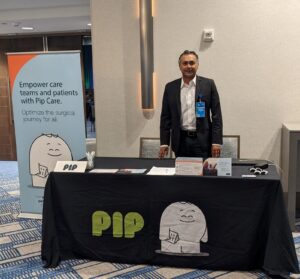By Anupam Vats, Co-Founder and Vice President of Growth & Partnerships

Research shows that a critical part of improving surgical outcomes is raising the bar on perioperative care, thus our team was eager to attend the 2024 Perioperative Medicine Summit organized by The Society for Perioperative Assessment and Quality Improvement (SPAQI) in Orlando, Florida, March 14 to 16, 2024. Every year, this summit brings together physicians, administrators, and thought leaders in the perioperative care space from around the country who are working every day to deliver patients the best possible surgical outcomes. We are proud to work alongside these individuals and provide a solution that materially improves delivery and engagement with perioperative care and leads to better surgical outcomes.
Attending the summit with Kathy Kaluhiokalani, Founder and CEO, we were looking forward to meeting with and learning from a wide range of perioperative care stakeholders, and the conference was exactly what we had hoped for. We connected with hospital systems with advanced perioperative programs, hospital systems that are in the middle of expanding their program, and some hospital systems that are at the beginning of their perioperative journey. The summit was a fantastic opportunity to engage with many different participants in the surgical and perioperative care process and explore ways to collaborate to improve patient outcomes and reduce the administrative burden on care teams and health systems.
Key takeaways from the conference:
Evidence-based clinical data demonstrates that delivering perioperative care improves patient outcomes. This is why Pip Care was created, to optimize the surgical journey, including perioperative care to actualize improved patient outcomes.
Patients that actively participate in their perioperative care are more prepared for surgery. These patients arrive in better mental and physical health for surgery and experience improved surgical outcomes.
Optimizing perioperative care is a true team sport. Offering patients the best possible perioperative care does not come from just one nurse, surgeon, or administrator, it requires collaboration across the entire health system and investment in resources for patients and care teams before, during, and after the surgical episode.
Improving perioperative medicine can bring down costs throughout the U.S. healthcare system. By empowering patients and care teams with the right tools, support, and preparation, it is possible to reduce unnecessary preoperative testing, rates of infection, and overall length of stay.
The programming at SPAQI 2024 was insightful and provided opportunities for us to deepen our understanding and commitment to this important space in medicine. On Friday morning, we attended “Artificial Intelligence (AI) in Surgery and Perioperative Medicine” presented by Tyler Loftus, M. D. University of Florida. Dr. Loftus explained that rather than having binary go/no-go decisions, AI can help build a customized plan for patients with all risk levels. For example, models can be used to predict the 30-day risk of mortality and complications, and then determine what is the next step to improve patient safety and quality of life. Most interestingly, Dr. Loftus highlighted how humans and technology must work together to lead to the best possible results. This message resonated with us because it aligns perfectly with the philosophy of Pip Care. We are a care management platform pairing both human health coaching and a digital solution to empower patients and care teams with the tools they need to deliver optimal perioperative care.
The frailty of patients was another important topic and demonstrated the importance of Pip Care’s solution. Another Friday session, “Physical Frailty: How Do We Optimize?” presented by Jeroen Molinger, MSc, MSc Duke University and Heather Nye, MD, PhD, SFHM, FACP University of California – San Francisco, covered how physical exercise, nutritional interventions, and psychological support can help patients better prepare for their surgery. Pip Care health coaches work with patients to ensure they are moving and tracking physical exercise (e.g. walking), improving nutrition (e.g. increasing protein intake before surgery), as well as providing psychological support in the form of 1:1 health coaching sessions, during which coaches provide patients with tactics for managing stress and anxiety and discuss plans for surgery preparation and post-operative recovery.
The 2024 Perioperative Medicine Summit brought together leaders who are committed to transforming perioperative care and we were able to spend time with these leaders learning from and collaborating with them to find the right mechanisms to improve patient outcomes and experience while increasing revenues and margins for the health systems. Until next year, SPAQI!

